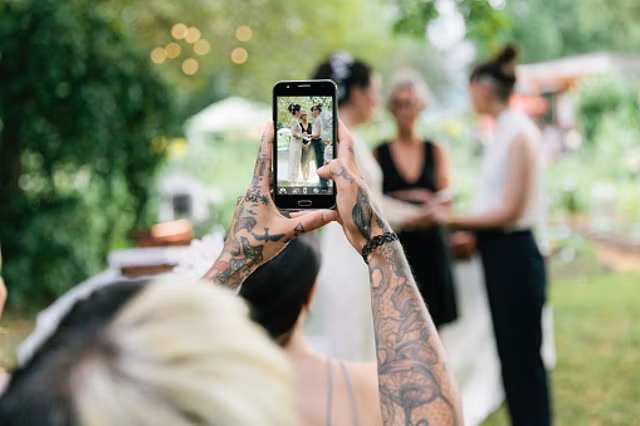While the majority of contact lens wearers benefit from the vision support they provide, some have reported tragic outcomes from trading in their glasses.
Rachel Prochnow, from Austin, Texas, was one of the 45 million people in the United States who wears contact lenses on a regular basis. Despite having worn them since she was 12 years old, no doctor ever gave her any reason to worry that they could harm her health. Sadly, in 2023, while 34 weeks pregnant, she "went blind" in one of her eyes after wearing her lenses in the shower. Prochnow, who recently underwent a cornea transplant to redeem her vision, now wants others to know about the rare condition that caused her blindness that optometrists never warned her about.
"I thought I was doing everything right," Prochnow, who was diagnosed with acanthamoeba keratitis in 2023, told Newsweek via email. "I never slept in them, I replaced my lenses with a new set when I was supposed to, I only used contact solution to store them in, and even replaced my contact lens case once every two months.
More From Newsweek Vault: What Is a Health Savings Account?
She added: "It wasn't even written on the packaging of the lenses to not get them near tap water. You have to delve deeply into the manufacturer's instruction care PDF online to find this information."
Acanthamoeba keratitis is relatively rare, but can be devastating. The U.S. Centers for Disease Control and Prevention (CDC) defines the condition as being a serious infection of the eye that can result in permanent visual impairment or blindness. This infection is caused by a microscopic, free-living amoeba, a single-celled living organism called acanthamoeba that can get into one's eye through contact lenses.
"It happens when you are wearing your contacts and you shower, swim, or hot tub with them in," Prochnow, who is a content creator, said. "You can get it anytime your contacts come in contact with tap water, so this includes washing your face with your contacts in. Contacts create microfissures in the eye that are so small you typically don't notice them, but when water with these amoebas goes over your eye, some can get stuck in between the lens and your eye."
Prochnow endured a grueling treatment regimen, including round-the-clock eye drops every hour for three months, multiple medications, and eventually a cornea transplant in a hope to reverse the effect of the condition.
More From Newsweek Vault: Compare the Top Health Savings Account (HSA) Providers
The mother-of-one had to be induced at 37 weeks pregnant to begin oral treatment, otherwise she would have lost her whole eye. Prochnow's treatment involved taking miltefosine, an intense drug that required weekly blood work to monitor for potential renal failure, and other medications that caused significant side effects. Fortunately, her sight is now improving and has the potential for 20/20 vision.
"Wearing contact lenses in the shower is a big no for many reasons," Dr. Meenal Agarwal, an award-winning optometrist based in Ontario, Canada, told Newsweek. "The most important being the increased risk of infection. Shower water contains bacteria that can cause a serious eye infection called microbial keratitis, and if bacteria come into contact with your lenses, they get trapped against your cornea, leading to an infection which can be sight-threatening."
The optometrist added that acanthamoeba keratitis can also be caused by not cleaning or storing contacts hygienically, using tap water to rinse lenses or cases, and overwearing contact lenses.
"Essentially, the amoeba finds its way onto the front surface of the eye and infects it, leading to severe pain, light sensitivity, blurred vision, and permanent vision loss if not treated promptly and appropriately," Agarwal said.
Acanthamoeba keratitis can be difficult to diagnose and even more challenging to treat due to the amoeba's resistance to treatment. Typical treatment involves a combination of eye drops like antiseptics and diamidines, but a corneal transplant like Prochnow's can come into play when too much damage has been done to the cornea.
Prochnow took to social media on July 18 to share her harrowing experience in a bid to raise awareness about the condition. Prochnow, who goes by @rachelprochnow online, posted a video to Instagram that detailed her diagnosis and journey through excruciating pain and recovery. The video has since amassed more than 800,000 likes.
"One year ago, I went blind in one eye from wearing contact lenses in the shower," she told her followers. "It was the most horrible pain I had ever experienced, and today is the day I get my cornea transplant and hopefully my vision back."
Her candid post highlights the hidden risks of everyday actions. As Prochnow continues with her recovery, her journey has made her a stronger person and a "better mother," who is more equipped to help others through challenges.
"I am so incredibly thankful for my transplant donor, my doctors, and my family who supported me through this ordeal," she said. "For the first time, I can see my baby with both my eyes."
Is there a health issue that's worrying you? Let us know via health@newsweek.com. We can ask experts for advice, and your story could be featured on Newsweek.
Disclaimer: The copyright of this article belongs to the original author. Reposting this article is solely for the purpose of information dissemination and does not constitute any investment advice. If there is any infringement, please contact us immediately. We will make corrections or deletions as necessary. Thank you.



